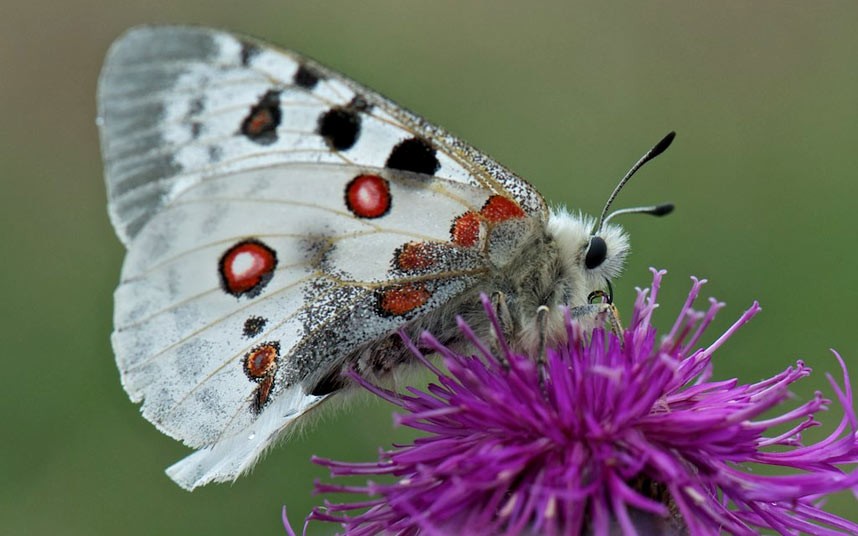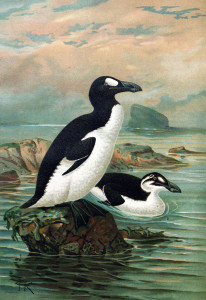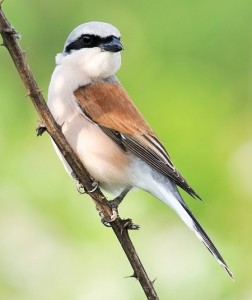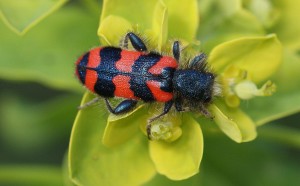
One of the odd things about British attitudes to nature is that the right-wing [Daily] Telegraph newspaper has such good graphic coverage of many issues, such as the ongoing extinction of species in England over the past two centuries. The gallery of beautiful photographs is shocking for its immediacy: there are species I’ve seen, and others I feel I should have, like the Red-Backed Shrike (1988). The Scottish Wildcat is not quite extinct in Scotland — I’ve been lucky enough to glimpse one, as far from anywhere with domestic cats as is now possible in Britain — but has gone from England. Here are birds and butterflies, weevils and the handsome Blue Stag Beetle (1839). The lovely Apollo butterfly is one of 421 species we have already lost.
Of course it’s part of a campaign, the Lost Life Project launched by the Species Recovery Trust.

Local extinction isn’t quite as bad as the ‘real thing’ — extinction from the planet, the fate of the unhappily flightless Great Auk (1820s), hunted until it was gone. It was simply too easy for anyone with a boat to collect a bird or two for their dinner, and this magnificent bird was gone for ever.
That’s the point, really: the reasons for each extinction are banal, stupid. The Red-Backed Shrike was wiped out by three things.
-

Red-Backed Shrike (Robert Zappaterra/Species Recovery Trust) First was the steady nibbling away of its heathland habitat for farmland and housing.
- Alongside this was the intensification of agriculture — destroying “useless” and “waste” corners of scrubland, “improving” grazing with fertilizer and so (unintentionally or not) allowing taller grasses to outcompete all the flowers of the meadow; and in turn that did away with many of the insects on which Shrikes prey, if they had not been destroyed by insecticides applied to nearby arable crops.
- Finally, the illegal collection of eggs, of what was towards the end a very rare and therefore perversely tempting target, helped to eliminate what conservationists, nature-lovers and egg-collectors all presumably agreed was a beautiful and exciting species.
In short, progress or development (call it what you like), greed and stupidity — in equal measure — threw away something we all loved.

A handsome Soldier Beetle like Trichodes alvearius, for instance, is common enough in continental Europe. When I photographed it in France, I knew I’d never seen it in Britain, but supposed it had never lived here. Discovering that it went extinct in the 19th century — that my great-grandfather might well have seen it as he strode about the countryside as a boy — is poignant.
In fact another species of Trichodes, T. apiarius (if this reminds you of bees, you are right: the name means ‘of bee-hives’, as does ‘alvearius’: both species frequent hives, their larvae growing there, feeding on bee larvae), was also driven to extinction here (1830).
The corncrake (1990s), the chequered skipper (1976), the Mazarine blue (1903), the large copper (1864), the large tortoiseshell (about 1953), the Norfolk damselfly (1958), the Burbot (1900s), the greater mouse-eared bat, mosses, moths, sawflies, shrimps, spiders, snails, flowers, grasses, ferns, solitary wasps, the roll-call of doom drones on and on.
If we do nothing there is no doubt at all what will happen, not only in Britain but across the planet. In the plain words of the Lost Life Project:
The world is currently experiencing the sixth mass extinction event, caused largely by human activities that continue to damage and destroy biodiversity across the globe.
But the point is, there is hope. If we press for help for our rarest species, we may yet save them. Some species like the corncrake have with help come back from the brink, and can be found in a few lucky places.
How to press? Lobby your local MP. Speak to the other candidates. Ask them what they will do for nature. Will they ensure that all the schoolchildren in their constituency get a chance to see a nature reserve, go pond-dipping, hear birdsong? Will they insist on gardens for hospitals, hospices, and old people’s homes to assist with healing and wellbeing? Discuss it on your blog, Facebook, Twitter, with your friends. Join a conservation group, a pressure group. Give some money. If you can’t think of anything better, sign a petition! There are plenty more sharp questions you can ask (feel free to ask me for some more suggestions).
